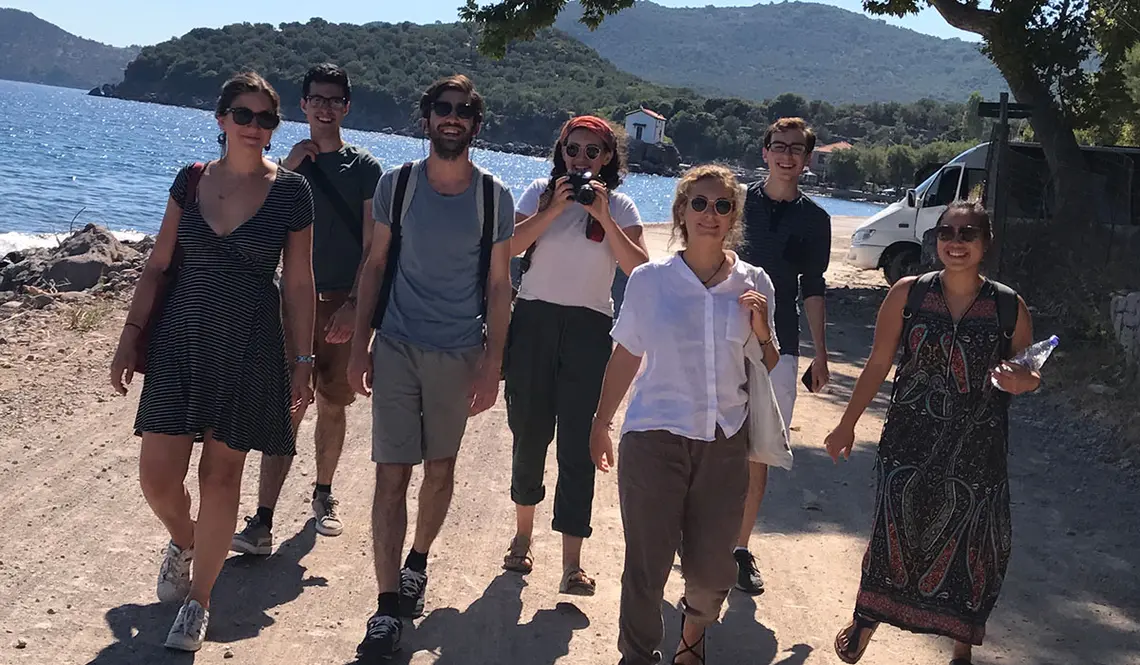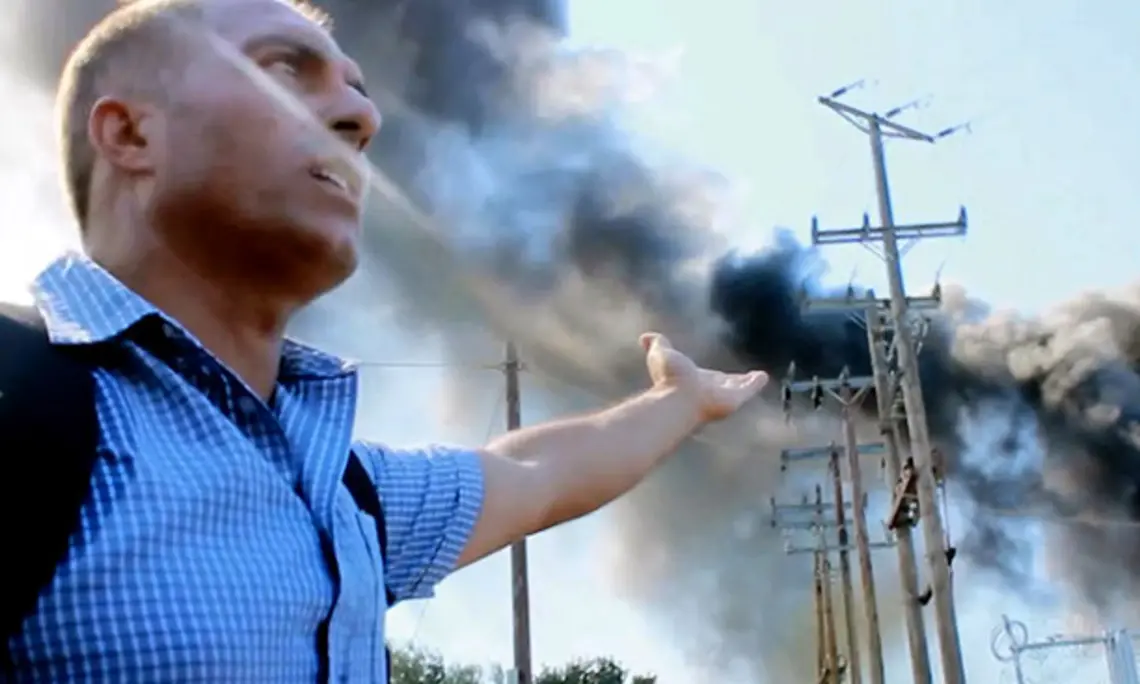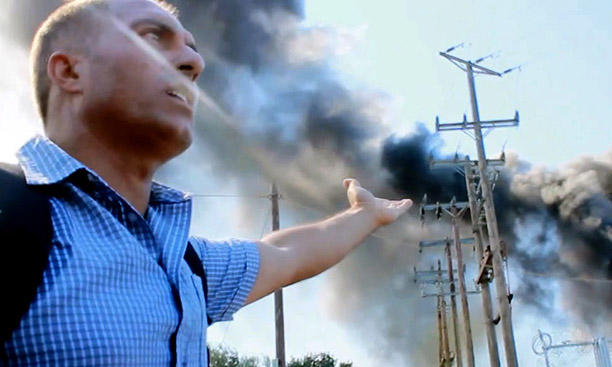

Q&A: Talya Nevins ’18 and Alice Maiden ’19 on Reporting About Refugees in Greece
PAW’s Q&A Podcast — August 2017
Last month, on the Greek island of Lesbos, when a smoke-filled riot broke out at a camp housing migrants seeking entry into Europe, the first journalists on the scene were Princeton undergraduates — students in a summer global journalism course taught by Joe Stephens, the Ferris Professor of Journalism in residence. Their work made headlines in the English-language version of Kathimerini, a leading Greek newspaper, and The New York Times international edition. We recently spoke with two of the students, Talya Nevins ’18 and Alice Maiden ’19, about the lessons they learned from the course.
Stories from the seminar are available at commons.princeton.edu/globalreporting2017.
This is the second in a new series of interviews with alumni, faculty, and students. PAW podcasts are also available on iTunes — click here to subscribe.
TRANSCRIPT
Brett Tomlinson: I’m Brett Tomlinson, digital editor for the Princeton Alumni Weekly. Last month, on the Greek island of Lesbos, when a smoke-filled riot broke out at a camp housing migrants seeking entry into Europe, the first journalists on the scene were Princeton undergraduates — students in a summer course taught by Joe Stephens, the Ferris Professor of Journalism in residence.
We recently spoke with two students from the course — Talya Nevins ’18, a Near Eastern studies major from New York City, and Alice Maiden ’19, a philosophy major from Asbury Park, N.J. Alice is continuing her reporting on migration in Spain, with support from the Class of 1978 Foundation.
Because of conflicting travel schedules, we interviewed the two students separately by Skype, but we’re presenting the responses together. The first voice you’ll hear is Talya.
BT: Just to begin, this course in particular — what was the draw of doing an international reporting course?
Talya Nevins: I knew that the course had gotten great reviews. I knew a few people who had taken it last summer, and I knew it was a really good opportunity to witness what was happening with the refugee crisis in Greece firsthand, because I’ve worked a lot on the refugee crisis in other capacities. I worked with a nonprofit that helps refugees a few summers ago, and I helped put together one of these refugee issues conferences at Princeton in the fall, but I felt that for a long time I’ve been very dependent on what the media would report, and I wanted to see for myself, and that meant going as the media instead of as the readers. And yeah, I was really — it was really great. It lived up to the expectations.
Alice Maiden: My name’s Alice, and I was also in Elaine Sciolino’s class this past spring, “Local Reporting: Paris as a Case Study.” So that was a class that went to Paris for spring break to report on local issues, political issues, as the French election was approaching, and that was kind of my first introduction to a reporting class, and luckily also went on a trip, so that was a cool kind of foreign correspondence experience that made me want to apply to the Greece one.
I was really interested in learning more about the refugee crisis from a philosophical perspective in, like, potential thesis work, from an anthropological perspective, and journalism seemed like a really good lens for understanding it, because you are kind of starting from scratch and just asking questions and not coming in with preconceived notions, and this class was a really good, like, extended opportunity to understand it, or as much as you can, based on being there instead of just reading whatever happened to come into the news.
BT: And how long were you in Greece?
TN: Five weeks. Two weeks in Athens and a week in Lesbos, and then two more weeks in Athens.
BT: So one of the days that I’m sure stands out for you and certainly stands out in the website that includes some of the stories that the class wrote was July 10 — I gather you were — that was your week on Lesbos, and you were on the scene during a riot at the migrant camp at Moria. Can you take me through that day and what you saw, what you heard?
AM: Yeah, so that was on — that was on Monday. And we had been in Moria on Friday for a couple of hours, doing some interviews and talking to migrants outside of the camp, because you’re not permitted inside of it — it has, it’s blocked off by big concrete walls. So — but there are these shops set up right outside where a lot of the people who are staying in the camp spend a lot of their days. And so we had been doing interviews there, and we just went back on Monday to continue interviews. And we kind of thought the day was almost over when the riot broke out. We had — what was interesting is a lot of the complaints that we heard in the riots — in the actual riot as it was happening, were things that were echoed immediately before, when we were just having conversations when everything was quiet.
TN: I was interviewing these two guys; one was an Afghan farmer who I was talking to about his experience, and then an Iranian guy who was helping translate between us. And he — suddenly we heard this bang, and the Iranian translator jumped up and just, like, sprinted off into the distance, and we were kind of like, “Oh, what’s — what was that, what’s happening?” And a few minutes later we decided to go see for ourselves, and there was just this huge column of black smoke billowing up to the sky; it was very clear that there was a large fire in the camp —they were probably burning tires or something to make the smoke really black. It was really dramatic, and then there were — about three hours of chaos ensued. There were no other journalists on the scene when the riot broke out, and I’d say for about half an hour, or — about half an hour, we didn’t see any other journalists, and then they started arriving.
AM: The smoke blocked out the sun for a while, like, it was really, really terrifying-looking. And everyone was standing there kind of in crowds, confused, because no one was really — like, the only authority voices you could hear were some people yelling, but it was kind of unclear what you were supposed to do, and it smelled horrible. Like, it was definitely dangerous to breathe, and mothers, children, just standing there holding cloths and T-shirts over their faces, and it was just kind of chaos for, like, an hour. And we were just running around trying to talk to people.TN: But we were outside the camp the whole time — I mean, it was all the people from inside the camp who just exited. So that was really the best opportunity we could have to see what the current population of Moria camp actually looks like. A lot more African refugees than Syrian refugees. And so everyone came out of the camp; you could see the burning from inside the camp. We went around to the side to get a different angle, and we could see flames — there were a few tents that were burnt out. At least two or three buildings were completely burnt. I — some of the people I’d been interviewing, I had their phone numbers, and they went inside the camp and were sending me videos and photos from inside, so that was also interesting, to be able to, although we couldn’t actually go inside ourselves, other people who lived there could go in and out and were sending us footage from inside. There was some fire brigade, but they didn’t — there was one truck that came but didn’t go inside for a while, and then eventually it did go inside, after an hour or two. So we were basically just outside, right in front of the gates of the camp, basically with everybody who had come out of the camp just watching it burn. And then by the time we left, it was about three hours after the first kind of bang was heard, explosion — there had been some riot police who’d gone inside.
BT: It’s an unusual experience for any reporter, but particularly a student reporter who had not had a ton of background with that type of situation. What were your instincts in that moment? What sorts of things did you feel like you had to record and take note of?
AM: Immediately we just took out our cameras, and Talya and I both had a DSLR camera, and Jack, the other student with us, just started live-tweeting the whole thing. And we just kind of kept it running for the whole time. And, I guess, what made it less — not less jarring, but less, like, disorienting was that because we had been there for a couple of days, and we had been there for a couple hours beforehand, it felt a lot less like we were just running on and trying to capture, like, dramatic scenes, but we kind of kept flocking back to the people that we had been talking to and asking, “What’s going on?” You know, asking the people that we knew and the people that had been explaining the situation kind of to add more details, and they would point us to other people who spoke better English and stuff. So it — I guess in the moment it didn’t seem very confusing, because you just knew that you’d have to kind of get images of this, because we were the only ones there in the very beginning, and it was such a terrifying image of the, the black smoke and everyone running around. If you have the best camera there, you have to get a picture of it or you have to get a video of it.
BT: Had you been hearing in your conversations with people that it was volatile inside, that there had been, you know, previous incidents, or was this a shock to you to see so — something, you know, to see this black smoke billowing and the people kind of exiting the camp?
TN: Well, it was no shock that people were unhappy inside the camp. That was well-documented by all the people that I spoke about, talking about how their food was terrible, their conditions were much too cramped, they were waiting without — for interminable periods —without having any real updates about their status. So the fact that the conditions were bad was not a surprise, and nor, really, was the fact — the idea of a riot. We weren’t expecting one that day, but there had been, a while back, there was a much larger riot in Moria, where people actually died. Nobody died in this, this time. But since July 10, it seemed that conditions in the camp have become increasingly volatile, more so than average, because when — on that day, people are saying, “Yeah, this is frankly not a shock, this happens all the time,” not in the sense that there are giant fires all the time, but in the sense that people are, you know, trying to get their voices heard in any way they can, and it erupts into violence every now and then. But since then, we’ve seen footage from inside the camp of police or guards, like, brutalizing migrants; there’s been an attempt at a peaceful protest, which was more of a march through the camp; I don’t have exact details, but it’s — we were sent some footage from inside the camp also, so it seems like, although I don’t know, I’m not super familiar with the situation before we were there, it does seem like there’s been more mobilization or more efforts, or maybe they’re just the aftermath of the riot.
BT: In your reporting, both there and in Athens, what were some of the most memorable conversations that you had that kind of gave you insight into the situation, both for — you know, both for refugees but also for the people of Greece, who are kind of witnessing the situation firsthand?
TN: Well, there was this one shopkeeper who worked right outside Moria camp on Lesbos; she’s the one who I had gone back to see, because I had connected with her previously. And she’s Greek, she’s from Lesbos, and she was the first shopkeeper to open a shop at Moria, and she opened it to — it’s just a little stand, basically. She has a kettle and can make coffee or tea and has some chips and snacks. But she — two years ago she decided to open a shop in Moria camp itself, and she was the only shop there for a few months. And then — I think about four months. And then a bunch of other shops kind of moved in, and then they were all told to get out. So now there’s this whole kind of — just like an assortment of shops right outside the entrance to the camp, run by Greek people, and in each shop there’s kind of a different contingent of people from inside the camp who hang out at that shop every day.
But it was really interesting to talk to her about how the people of Lesbos, from her perspective, have been responding to the presence of so many refugees on their island. She talked a lot about how people want to be really welcoming, and Greeks really feel for the refugees who are coming through, but also, you know, they’re having a hard time, because the entire tourism industry on their island has been really struggling. For a while it was really — the tourism industry was kind of propped up by all the volunteers and journalists and NGO workers and whatnot who were there, but now that that’s kind of died down because the giant wave of refugees is no longer a giant wave, but it’s more of a trickle, so — but people are still not coming to Lesbos in the same way as they were before 2015.
BT: There was a similar course, similar project last year, and we had a story in the magazine about it in which Joe Stephens said that — and I’ll read a quote here: “Our journalists came away with a deeper understanding of the roots and the impact of the migration crisis, which will be one of the defining events of their time.” Did you — kind of seeing it firsthand, did you get the sense that this is a defining event and something the world will remember?
TN: Well, of course. I mean, you’re seeing this massive shift of populations. There have been 1.3 million refugees who’ve passed through Greece, and, I mean, the UN is currently estimating about 48,000 of them are still in Greece, and frankly it doesn’t look like most of them are actually going to be able to leave. It’s going to be a massive project of integration, as it is all over Europe, as it is in Turkey. But there’s this just enormous number of people, 5.5 million Syrians, 2.5 million Afghans, and then many others, who are just going to have to start new lives in new countries, and it seems like the world has not yet — or large parts of the world have not yet accepted that that’s the new reality. This was something that I was fascinated by in Greece, which was that, you know, there are going to be tens of thousands of these refugees who are going to have to integrate into the Greek society, because that’s how asylum law is working for them right now. But the Greek economy doesn’t have enough jobs for its own citizens; nobody really knows what jobs are available to refugees, other than ones who speak English who can serve as translators. So there’s this huge obstacle of integration that everyone’s kind of looking at, and it’s going to be so interesting to see how it plays out, but I really hope that people can do it in a way that’s humanizing to refugees who are in search of a better life. This is the largest number of displaced people since World War II, and, you know, it’s not one war that’s the root of the issue, but it is that big of a migration.
AM: One of the points that Professor Stephens made was that even though the people — even though huge numbers of people have stopped coming into Europe, if anything, that’s more important to report on now, because not as many reporters are there, and maybe it’s not seen as such a huge issue as much now as it was last summer, for instance, but now all these people are stuck there with — stuck in Greece, stuck in camps elsewhere with nothing to do; they can’t work, they can’t move on with their lives, they’re stuck in this limbo that’s made even worse by the fact that the world’s attention has shifted.
BT: It also seems interesting that Princeton, that doesn’t have a journalism major or journalism department, still has this amazing opportunity to go abroad in the summer and do work like this. I’m curious, you know, how you feel about the opportunity that you were given, and also, Alice, if you could explain the work that you’ve been doing since the end of the course.
AM: Sure. So I think it’s hugely important that Princeton has this opportunity, and I’m so, so grateful, because I can’t think of a better way to learn about something that is one of the most important things to learn about right now than by being here, and than by journalism, because even if Princeton doesn’t have, like, a journalism major or anything yet, it’s — journalism is just the process of, like, asking questions and learning about events as they’re happening — in political context, cultural context, all the other kinds of education that Princeton has, all the classes I’ve taken about — in philosophy and anthropology have kind of served as a background to understanding this. So it’s a very real way of learning about pressing issues in the context of other things that Princeton is trying to educate us about.
I’m not sure if I want to be a journalist, but the journalism classes at Princeton seem to be less about necessarily professional training for future journalists and more understanding a lot of really complicated issues by being in the place where it matters to be right then. Whether or not I’m a journalist, I think, in terms of anything I’d want to do, it’s just been a really valuable experience to kind of learn about how — learn about how the best way to learn is, and learn about how to communicate and understand issues and look to every side of an issue.
I’m just getting started now, but I’m hoping to — one of the things that drew me to Spain was that Spain is kind of — in contrast to some of the places we went to in Greece, is not participating as much in taking in refugees, and Lesbos, I think, is — Lesbos has just been talked about as the — the locals in Lesbos have been applauded for their acts of hospitality in helping, taking people in, and caring for the migrants that came to their shores, but Spain has not fulfilled its end of the deal and hasn’t had as many refugees coming in. But now, because — especially since the EU-Turkey deal in March last year, more migrants are coming in through Spain and Italy, so since — since more people are coming along that route, it’s kind of an interesting case of a country that hasn’t participated as much as other northern European companies and Greece, but has a strong sense of local solidarity: like in Barcelona, where I am now, there’s plenty of people that are willing and hoping to take in refugees more as a city, and that I’m also hoping to travel to southern Spain for a while to the ports where refugees are still arriving, especially from Africa, now, as more migrants have been taking the route between Morocco and Spain and going to Spain and Italy instead of Greece, since the borders have been closed and so many people are stuck in Greece.
So I’m both hoping to look at resettlement, because in Greece I’d looked a lot at the refugee camps themselves. I’m hoping to be able to look at the refugees who have been resettled in Spain, maybe are being resettled now, have been resettled for a couple years, to kind of see the end of the arc of that process as it plays out in Spain, and then also look at the news that’s happening kind of right now as migrants are arriving in southern Spain from African shores.
BT: Well, thank you so much for taking a few minutes to talk. I really appreciate it.
TN: Thank you.
AM: Thank you, Brett. Appreciate it as well.
BT: You can read the stories from this summer’s global journalism seminar on the course website, commons.princeton.edu/globalreporting2017.
If you’ve enjoyed this podcast, we invite you to subscribe in iTunes. We’ll be publishing more interviews, along with our PAW Tracks oral-history Podcast, when our new publication year begins in September.
Paw in print

January 2026
Giving big with Kwanza Jones ’93 and José E. Feliciano ’94; Elizabeth Tsurkov freed; small town wonderers.



No responses yet